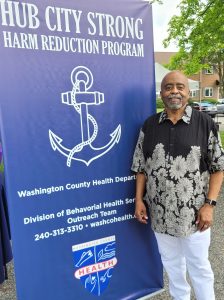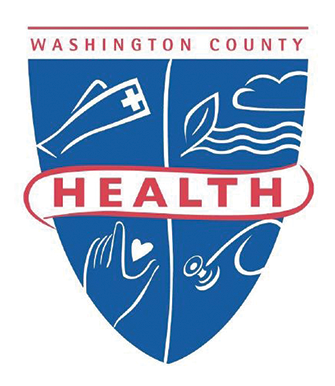
David Washington knew before his tenth grade year in high school that he was meant to serve others and support them right where they are, especially in their storms.
“I had a serious health scare as a teen, which ended up not affecting me just physically, but significantly changed the way I thought about the life I wanted when I grew up,” he says.
Since 2017, David has been the coordinator of the Washington County Health Department’s Harm Reduction program. It’s not his first go-around in public health, having worked in substance abuse prevention outreach and as a trauma specialist in the Washington County Detention Center.
Harm Reduction is not a new concept in community health, but is still sometimes misunderstood. According to the National Harm Reduction Coalition, it involves a spectrum of strategies, with interventions that reflect an individual’s and community’s needs. This means while there are principles central to the work, there is no universal definition or formula for harm reduction.
“Basically, we meet people where they are. We understand substance use is complex and we can choose to work to minimize the harmful effects of it rather than ignore or condemn this part of our world. In order to help reduce harm, we have to be non-judgmental and non-coercive with the services and resources we can offer,” he says.
The health department’s program is very holistic and offers support across the continuum of a person’s health. In Washington County, people can be tested for infectious diseases like Hep C and HIV; receive and learn how to administer naloxone in emergency overdose situations; participate in a support group for mind-body resilience through tai chi; receive syringe services to help combat transmission of bloodborne illness; or just get a hydrating drink on a hot day.
“Harm reduction programs aren’t about attempting to minimize or ignore the reality of harm and danger that can be associated with illicit substance use. We are here to respect and help other human beings, hearing their voices and thinking about the present and future not for me or for you, but for all of us, collectively,” says David.
When co-workers are asked to describe David, many share the same words – caring, kind, honest, dedicated, passionate, determined – and often with “the most,” “unmatched” or “all-around” attached to the sentiment. They say he has a “zest for life that is contagious,” is “a role model, mentor and guiding light to the people he serves” and “believes everyone can reach their fullest potential.” One person who has worked with him for most of her career says simply, “He is one of my favorite people.”
David is quick to offer praise to the team of people he works with and for, saying they have “given me the space, support and affirmation to do what I do.” He is grateful to have had opportunities to work with leaders in the field through his position with the state of Maryland at the health department.
Many who know David are quick to note that the COVID-19 pandemic did not stop him from continuing to serve, albeit in the safest way possible. One says that he “takes his work with recovering people very seriously and cares deeply for his patients.” When he wasn’t helping on the job, he remained very active in his church, New Light Metropolitan Community Church in downtown Hagerstown, where he and others took bags of food and hygiene products, stayed masked and six feet apart and offered the human contact that they could safely.
David has a master’s in social work, but began higher education studying music therapy with the intent to perform. The health scare in high school directly impacted his voice box and the direction his path would take, but Washington County is grateful he moved forward in harm reduction services and never looked back. A more suitable and humble person of the year can not be found in our community.
Thanks David!

